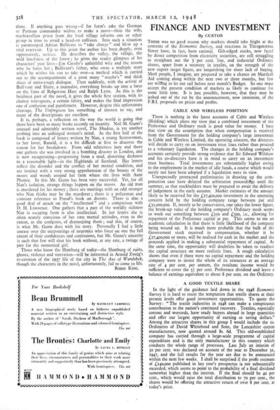FINANCE AND INVESTMENT
By CUSTOS
THERE was no good reason why markets should take fright at the contents of the Economic Survey, and reactions in Throgmorton Street have, in fact, been rational. Gilt-edged stocks, now faced by direct competition from electricity securities, are still struggling
to straighten out the per cent. line, and industrial Ordinary shares, apart from a recovery in textiles, on the strength of the new export target figure, are languishing for sheer lack of buying. Most people, I imagine, are prepared to take a chance on Marshall Aid coming along within the next two or three months, but few are willing to let out sail before next month's Budget. So one must accept the present condition of markets as likely to continue for some little time. It is just possible, however, that they may be jerked out of the rut by the announcement, now imminent, of the F.B.I. proposals on prices and profits.
CABLE AND WIRELESS POSITION
There is nothing in the latest accounts of Cable and Wireless (Holding) which alters my view that a combined investment of the Preference and Ordinary stock is good value for money. I base that view on the assumption that when compensation is received from the Government for the holding company's large investment in Cable and Wireless Limited, the operating concern, the directors will decide to carry on on investment trust lines rather than proceed to a voluntary liquidation. The changes in the holding company's accounts certainly provide strong evidence that Sir Edward Wilshaw and his co-directors have it in mind to carry on an investment trust business. Total investments are substantially higher owing to the employment in the market of idle funds, a course which would surely not have been adopted if a liquidation were in view.
Unexpectedly protracted preliminaries in drawing up the com- pensation case have delayed the arbitration proceedifigs until the summer, so that stockholders must be prepared to await the delivery of judgement in the early autumn. Market estimates of the amount likely to be received for the £27,400,000 investment in the operating concern held by the holding company range between par and L35,000,000. If, merely to be conservative, one takes the lower figure, the break-up value of the holding company's Ordinary stock seems to work out something between L250 and L300, i.e., allowing for repayment of the Preference capital at par. This seems to' me an academic calculation in that there is little likelihood of the company being wound up. It is much more probable that the bulk of the Government stock received in compensation, whether it be L27,400,000 ormore, will be realised for cash in the market and the proceeds applied in making a substantial repayment of capital. At the same time, the opportunity will doubtless be taken to readjust the capital structure on more realistic lines. A rough calculation shows that even if there were no capital repayment and the holding company were to invest the whole of its resources at an average rate of 4 per cent. per annum, the resultant income would be sufficient to cover the 51 per cent. Preference dividend and leave a balance of earnings equivalent to about 8 per cent. on the Ordinary.
_ A GOOD TEXTILE SHARE In the light of the guidance laid down in the 1948 Economic Survey it is hard to resist the temptation that textile shares at their present levels offer good investment opportunities. To quote the Survey : " The textile industries in 1948 can make a conspicuous contribution to the nation's continued recovery. Textiles, especially cottons and worsteds, have ready buyers abroad in large quantities and offer our largest opportunity of earning or saving dollars." Among the attractive shares in this group I would include the is. Ordinaries of David Whitehead and Sons, the Lancashire cotton manufacturers, now quoted. around 8s. 6d. This old-established company has carried through a large-scale programme of capital expenditure and is the only manufacturer in this country which conducts the whole range of processes. Last July an interim of 3o per cent. was declared on account of the year to December 31, 1947, and the full results for the year are due to be announced within the next few weeks. I shall be surprised if the profit estimate of £14o,00o published in last year's prospectus is not substantially exceeded, which seems to point to the probability of a final dividend somewhat higher than the interim. If the final should be 4o per cent., which would' raise the total distribution to 70 per cent., the shares would be offering the attractive return of over 8 per cent. at ' today's price.


































 Previous page
Previous page